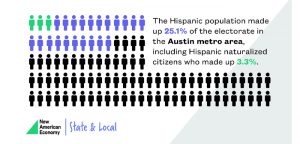By Moses Leos III
It was her experience of consulting with entrepreneurs that led Carina Boston Pinales to craft an idea that eventually became a business venture.
She realized there was a growing trend of start-up businesses and individuals that couldn’t find office space, but still sought a physical location to network, market and engage with clients.
Her idea became reality in 2014 when she founded Splash Coworking, which assists individuals by providing a location for them to conduct business. Pinales hopes her venture helps incubate the growing trend of small businesses in the area.
“I thought this would be something in San Marcos that would resonate with the community,” Pinales said.
The city of Kyle, similarly, had the same idea on growing locally grown businesses. In its Economic Development Strategic plans, which the council approved in October 2015, the idea of an incubator kind of office setting was bantered around during the development of the plan.
And Buda has also looked into the idea as one possible use for its current city hall – when a new city hall is built to house the city offices.
But the San Marcos project is the first south of Austin to actually take shape.
Pinales’ coworking idea began when the San Marcos Main Street Program hired her and another person to conduct a feasibility study on the subject. She found the business model was steadily growing.
Pinales discovered San Marcos has an “orphaned start-up community” between the anchor cities of Austin and San Antonio. Making up this demographic is a “good collection of individuals” who range from older millennials, 24 to 36 years old, to older, retired individuals.
While their ages differed, they all shared the want to connect with others, while conducting business outside of their home. But the cost of finding adequate and cost effective office space was a challenge.
She said San Marcos has a shortage of executive offices in the area. What the city has in terms of office space fits “more of a developed professional company.”
The 2008 economic collapse, Pinales said, helped facilitate the resurgence of coworking, which is an “umbrella word” for a shared space incubator and business accelerator.
“It helps individuals who freelance and small start-ups be able to have professional space to use when they don’t have capital or overhead for a traditional office,” Pinales said.
According to Pinales, the coworking idea allows start-ups to connect with the business community and other organizations, which is important in smaller communities.
Buda Area Chamber of Commerce Executive Director J.R. Gonzales said the coworking idea is an “excellent resource” for upstart companies that need a satellite office.
Gonzales said clients feel “more comfortable” with businesses that have a physical location, rather than being located in the business owner’s home.
He also said it assists small businesses obtain presence and resources before they make the transition to a storefront.
“These type of operations fill that niche,” Gonzales said. “It provides an excellent first step toward starting a business.”
For Pinales, working toward opening an 8,000 square foot facility in downtown San Marcos is her goal. Her proposed facility will have a capacity of 300 people and will have conference and meeting rooms.
She recently has started up “pop-up coworking” events, where local businesses allow space for her clients to network.
“It’s amazing to see everyone come out of their cubby holes to network,” she said.
Pinales believes business will see a shift in coworking within the next two to three years.
With businesses cutting cubicle sizes, along with more telecommuters and employees working from home, coworking could become the norm.
She said individuals from Martindale, New Braunfels, Kyle and Buda have contacted her regarding coworking.
Pinales said she hopes to see more versatility among the Interstate 35 communities.
“More people are pushing out of the larger cities,” she said. “Buda and Kyle are attracting more first time homebuyers.”
Gonzales also believes the trend will grow in the next few years. He believes there is “a need for a business like this in Buda” and that it would be “very successful.”
“It’s an operation that would be cost efficient for a young upstart or entrepreneur,” Gonzales said.
Coworking by the numbers:
36% increase in the number of coworking spaces in 2015 worldwide
7,800 coworking spaces operating worldwide
42% of coworking spaces are located in buildings that already existed 50 years ago
Half of coworking spaces are located in the original designated commercial units.
80% of space owners expect an increase in number of members in 2016
61% of all coworking spaces are planning to expand their workspaces in the coming year
Information from the 2015-16 Global Coworking Survey










